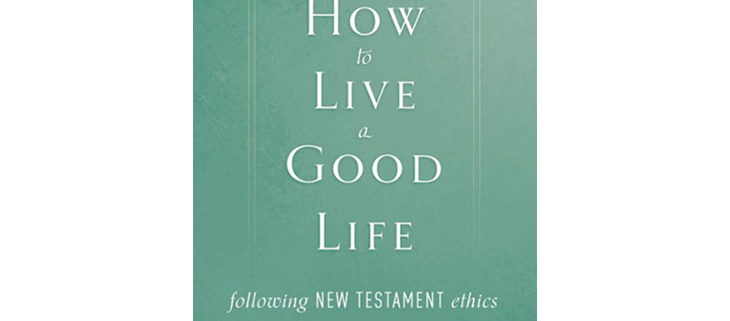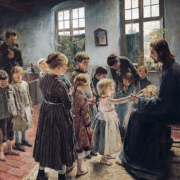New Book Offers Guidance on Living a Good Life
Preparing for life’s journey is the mission of every young person. But too often, education is focused on accumulating skills and knowledge without fully developing the virtues and ethics that lead to sainthood.
Vaclav Rajlich, a computer programming expert with a deep love for Christ, helps refocus priorities with his brief but valuable book, How to Live a Good Life Following New Testament Ethics. He provides a roadmap through daily decisions, intricate challenges, and even outright obstacles with the timeless guidance of Scripture.
This highly readable book makes a perfect gift for people of all ages – fathers and sons, mothers and daughters, spouses, friends and colleagues. It is ideal for book circles, discussion groups, dinner clubs and beyond. And it is well-suited for high school and college students, perhaps for summer reading, new student orientation or a retreat program.
Each chapter concludes with open-ended questions. In less than 150 pages, the reader discovers a roadmap for life – how to drive safely, understand the rules of the road, and arrive at the destination. Throughout the journey, the reader is called to make friends, share meaningful experiences, and achieve goals while keeping in mind the biggest goal: to live a holy and exemplary life.
Along the way, there will be obstacles – which the author knows well. Raised behind the Iron Curtain in Communist Czechoslovakia, Rajlich lived in near constant fear. He was always on guard and suspicious of those around him, never sure when his conversations were being recorded – an oppressive reality of Communist rule.
One day, the author met Pavel, who at about 30 years old was dying and bedridden with terminal cancer. He could barely move and experienced endless pain. Astonishingly, he radiated inner peace. With a wink or slight wave, Pavel comforted all who visited him, causing Rajlich to wonder how such peace is possible. Though a dying young man, Pavel exhibited no anger or resentment, only a joy about life. Rajlich, although fearful about a future crushed by the Communist regime, gained perspective from the dying man who was wise beyond his years. Pavel was far advanced in living a good and holy life.
Not long after meeting Pavel, Rajlich escaped to America and became renowned in his field of computer science. When he retired four decades later, he published this powerful little book.
One might reasonably ask, what business does a computer programmer and professor have writing a book about ethics? The answer may surprise you.
Early in his career, Professor Rajlich realized that conveying complex software concepts to undergraduate students requires distilling information to the essentials. The fundamentals provide a firm foundation. With the fundamentals in place, Rajlich’s students created programs that have changed the world for the better. Hundreds owe their careers to his wise and patient teaching.
In his book, Professor Rajlich tackles the fundamentals in the moral life. At Page 7, he explains the “story of the rich young man” as “an abbreviated version of the entire New Testament ethics, a kind of executive summary,” which St. John Paul II highlighted in Splendor of Truth. Rajlich draws other inspirations from the Catechism and the Splendor of Truth to present a series of practical, heartwarming and commonsense lessons – a wonderful recipe for life.
Rajlich explains, “Ethics or moral philosophy… answers the questions: ‘What is the right act in these circumstances?’ and ‘What is the best way to live?’” He equips the reader with a reassuring way of seeing and a practical way of doing. With precision and simplicity, he offers a handy mnemonic for remembering the four pillars of living a good life: the four Ps of Prohibitions, Prescriptions, Priorities and Providence.
Prohibitions are nonnegotiable rules of the road, while prescriptions are recommendations for a safe and fulfilling journey. Priorities involve making wise choices. Providence is the recognition that certain matters are beyond our control; with faith, we experience peace by relying on God’s grace and mercy. Taken together, these ways of pondering and proceeding enable sound daily decisions, resulting in peace of mind and heart. Rajlich’s approach sheds light and instills hope and confidence.
In an age of instant messaging and countless choices, this little book offers a timeless message at the heart of Catholic education: a celebration of the splendor of truth, as we grow in knowledge and strive to be co-workers in the truth. Rooted in faith and reason, a proper formation advances the fullness of wisdom and the realization that we are all made for more, formed in the image and likeness of God. Setting the reader on the straight and narrow path, this profound “how to” book addresses life’s most important questions in a clear and reassuring manner.
Like all dedicated teachers, Professor Rajlich makes the complex accessible. He offers a passport for living a good life and pursuing big goals. He addresses the false routes along the way and sheds light on how to proceed with peace, fortified by authentic freedom. As a kind and wise mentor, he presents sound advice. He encourages the reader to prioritize and live with kindness and courage amid obligations to family, neighbors and communities.
The human journey includes suffering and setbacks, but these can be opportunities to be light and leaven. We can all learn from Pavel. Every day, no matter how challenging, is a gift. How to Live a Good Life Following New Testament Ethics presents a sound approach to living with purpose and good cheer.
This article first appeared at The National Catholic Register.




 Photo by David Mark via Pixabay CC0
Photo by David Mark via Pixabay CC0

